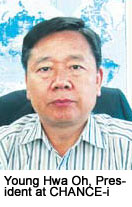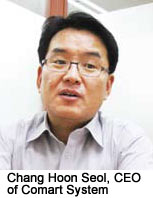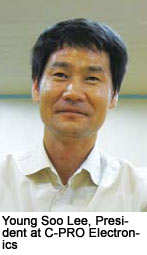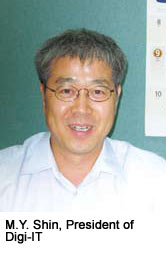As the global economic slump approaches recovery, Korean manufacturers gear up for 2010. Korean providers focus on distinguishing themselves from competitors in China and Taiwan with product differentiation. Expansion is part of their strategy as well, with an emphasis on emerging markets in India, South America and the Middle East.
As the global economic slump approaches recovery, Korean manufacturers gear up for 2010. Korean providers focus on distinguishing themselves from competitors in China and Taiwan with product differentiation. Expansion is part of their strategy as well, with an emphasis on emerging markets in India, South America and the Middle East.
To seize the IP trend, many Korean companies develop their own DSP technologies, such as C-PRO, Huviron, IDIS and APRO. Korean DVR manufacturers are also accelerating the migration from analog to digital with hybrid DVRs, such as CHANCE-i, Digi-IT, IDIS and LG Electronics.
Another vital trend is offering total solutions. With complete hardware and software lineups, notable players include IDTECK, Digi-IT, CNB Technology and LG.
Korean manufacturers supply to the world, ensuring strong market share by satisfying users. Their continuous R&D efforts keep themselves ahead of the pack.
(Note: The companies that follow are presented in an alphabetical order, based on company names.)
APRO Technology
APRO Technology has provided video surveillance equipment since 1995, including dome cameras, bullet cameras, box cameras, PC-based NVRs and LCDs. Its cameras have unique mechanisms for easy installation, featuring cable- managed concealed brackets for maintenance. Affected by the recession, APRO experienced a sales drop. "The Russian market was influenced the most by the economy in 2008, but business has picked up now," said Paul Yoo, Sales and Marketing Manager.
managed concealed brackets for maintenance. Affected by the recession, APRO experienced a sales drop. "The Russian market was influenced the most by the economy in 2008, but business has picked up now," said Paul Yoo, Sales and Marketing Manager.
Strategies and Core Competence
APRO's cameras feature customized three-axis cable-managed brackets and wall-mounted brackets for dome cameras, which not only prevent cables from environmental hazards but also are aesthetic. "We were the first to design a cover for dome cameras," Yoo said. With significant improvements in Chinese products, APRO believes product competition will only get more intense.
Future Outlook
APRO is optimistic about 2009, and is expecting 11-percent revenue growth. The company was listed on the KOSDAQ stock exchange in June 2009 and acquired a DVR company four months ago. "We will have our own DSP in 2010 and launch a full line of speed domes and IP modules," Yoo said.
CHANCE –i
Established in 1990, CHANCE-i first provided VGA graphic boards, then expanded to DVR boards and related products. Despite the global economic crisis, CHANCE-i's overseas market grew in 2008, particularly in emerging markets like Brazil, said Young Hwa Oh, President. However, in 2009, the company received fewer orders from the U.S. and Europe.
Strategies and Core Competence
The company specializes in software with PoS and access control, hybrid DVRs  and central management software. It also provides PC-based DVRs with MPEG-4 compression. "Our market strategy in the U.S. targets DVRs," Oh said. "Problems still exist for H.264 encoding and stand-alone DVRs are likely to have trouble searching available networks."
and central management software. It also provides PC-based DVRs with MPEG-4 compression. "Our market strategy in the U.S. targets DVRs," Oh said. "Problems still exist for H.264 encoding and stand-alone DVRs are likely to have trouble searching available networks."
With enhanced integration with access control, the company's new DVR applies second-generation MPEG-4 compression with 32 channels at D1 resolution. CHANCE-I will launch a compact PC-based DVR at the end of 2009.
Future Outlook
Due to product differentiation, the company does not feel pressure from Chinese competitors. "Chinese manufacturers prefer to produce stand-alone DVRs instead of PC-based ones," Oh said. "We cooperate with our Taiwanese partner to get an edge."
For the future, CHANCE-i is cautiously optimistic. "The 2010 security market will be the same as 2009, but we believe the world economy will recover slightly," Oh said.
CNB Technology
Despite the economic recession hurting 2008 sales, CNB Technology experienced positive growth in 2009.
Established in 1999, CNB's branded products are widely accepted in Europe, with a German branch opening in July. Sales in Russia and the Middle East increased,  while Asia sales remained flat. "About 90 percent of cameras in the
while Asia sales remained flat. "About 90 percent of cameras in the
Middle East have CNB's brand name," said John Cho, Overseas Marketing Manager. The company will focus on establishing channels in southern China to serve the Asian market and fortify distribution channels in the U.S. for the next year.
Strategies and Core Competence
CNB will feature a full range of video products for 2010, featuring network cameras, NVRs and central management software.
To fight off threats from Chinese manufacturers, CNB designs value-added functions into its products. "We provide exceptional after-sale support with product replacement through our two-year warranty," Cho said.
Future Outlook
CNB has transitioned from being a network camera manufacturer to a system provider. With its technical prowess and full-range product lines, CNB is confident about an economic recovery for 2010.
Comart System
Comart System started out 12 years ago with capture cards and shifted to video surveillance in the past three years. Since 2008, Comart reached into the camera field, targeting the US, European and Korean markets. "We are expecting growth to triple in the Korea market by 2010," said Chang Hoon Seol, CEO.
Strategies and Core Competence
 HD is a recent phenomenon. Comart is among the handful of companies that offer HD video solutions. "We believe if TV has shifted to HD, video surveillance will follow," Seol said.
HD is a recent phenomenon. Comart is among the handful of companies that offer HD video solutions. "We believe if TV has shifted to HD, video surveillance will follow," Seol said.
Comart's core products are branded HD surveillance cameras and DVR capture boards. "We will have HD DVRs soon," Seol said. "Compared with megapixel network cameras, HD video surveillance provides more reliable real-time images."
Future Outlook
Chinese manufacturers cannot compete with Comart, as it targets different markets. "Comart targets high-end users and we believe the high-end market will grow after the economy recovers," Seol said. "We look forward to our HD products making up about 50 to 60 percent of our total revenue for 2010."
C-PRO Electronics
With clear management and professionalism, C-PRO Electronics possesses the technology know-how to manufacture products for security since 1996. Affected by the economic downturn, C-PRO encountered a slight decline in the first quarter of the 2009.
Strategies and Core Competence
 C-PRO designs its own DSP chips with a top-down menu, designed for easy installation. With a common menu and adjustable functions, its DSP delivers resolution close to WDR quality. "C-PRO keeps up with different solutions to make flexible and suitable products for our clients," said Young Soo Lee, President.
C-PRO designs its own DSP chips with a top-down menu, designed for easy installation. With a common menu and adjustable functions, its DSP delivers resolution close to WDR quality. "C-PRO keeps up with different solutions to make flexible and suitable products for our clients," said Young Soo Lee, President.
Future Outlook
The company believes cameras with DNR features will be a new standard, along with network cameras in the industry. C-PRO also recognizes the potential of the IP market. "Network and analog cameras will have equal market share from 2012 to 2013," Lee said. "Compared to the HD surveillance market, IP infrastructure has fewer restrictions for distance, while HD surveillance may require standards for compression protocols and strong display support." For 2010, with the economy bouncing back, C-PRO is optimistic about the future.
Digi-IT
Digi-IT started out with DVR boards in 2001 and has expanded into hybrid products. As a niche player with great potential, Digi-IT supplies PC-based DVRs, video servers, software and accessories to the market. The company's sales regions include South Africa, Russia, the Middle East, the U.S. and the U.K.  Despite weaker demand in the U.K. due to the economic downturn, it is preparing for product releases and new customers for 2010.
Despite weaker demand in the U.K. due to the economic downturn, it is preparing for product releases and new customers for 2010.
Strategies and Core Competence
Digi-IT devoted itself to IP seven years ago, which has heated up since 2007. The company believes video content analytics (VCA) are vital, embedding its network cameras with its own VCA. "We also cooperate with system integrators to provide a total solution for our customers with a good price-performance ratio," said M.Y. Shin, President.
While it faces cutthroat price competition from Chinese manufacturers, the company has superior offerings. "People choose Digi-IT for our better system performance," Shin said.
Future Outlook
Digi-IT is optimistic about 2010. "We will fortify our product integration, NVR and IP hybrid products," Shin said, along with total solutions.
HDPRO
HDPRO has been committed to providing reliable products since 1995, with high quality and affordable prices. It makes cameras, LCDs and DVRs. "We don't want to make low-end cheap products which negatively affect brand image," said Michael Kim, Overseas Sales Department Chief.
While the recession hurt HDPRO's US and European markets, it increased overseas OEM/ODM orders due to local channel efforts.
Strategies and Core Competence
HDPRO's cameras portray practicality and aesthetics. Its camera housing designs  are user-friendly and support easy installation. An anti-cobweb camera holds international patents and is popular in Italy. "We installed a device to release a high-frequency sound, which keeps spiders away from the camera," Kim said.
are user-friendly and support easy installation. An anti-cobweb camera holds international patents and is popular in Italy. "We installed a device to release a high-frequency sound, which keeps spiders away from the camera," Kim said.
Its latest 3-D DNR chipset shows bright images with reduced noise in complete darkness without IR, highlighting the company's practical focus.
Aesthetic design is also key. "We hide the IR lights behind two side mirrors of the camera," Kim said. "This allows the camera to blend in with the indoor design."
Future Outlook
HDPRO believes the world market will pick up in 2010. "Brazil, Russia and China are places of great potential," said Kim. "Although these emerging markets are not established, we're prepared to form partnerships now, before we lose opportunities in the future."
Huviron
"Huviron registered as a venture company in 2001 and was listed on the KOSDAQ in 2002," said Lewis Oh, Assistant Manager. "This achievement is rare in the surveillance field." Established in 1991, Huviron provides quality cameras, DVRs, lenses and accessories. Starting out with CCD modules, the company passed overseas quality approvals including ISO 9001, FCC, CE, IP68 and PCT. The merger with Bicosys three years ago reinforced Huviron's product diversity.  Huviron emphasizes corporate team-building, which takes its organization to the next level.
Huviron emphasizes corporate team-building, which takes its organization to the next level.
Strategies and Core Competence
The core technology of Huviron is its two new DSPs. "Our core product applies the new DSP, with controllable IR LED output levels by RS-485, and supports easy installation for users," Oh said. Huviron will release a camera with 700-TVL resolution, along with a megapixel PTZ network camera at the end of 2009.
Future Outlook
When facing Chinese manufacturers, Huviron understands price competition is not a long-term strategy. "We increase our R&D investment and strengthen our product quality control," Oh said. "Our ability to respond quickly to customer needs is a plus and sets Huviron apart from other manufacturers."
iCanTek
Established in 2000, iCanTek provides network video products and solutions. "Our 2009 market revenue is basically the same as 2008," said Soon Ho Hong, President. "In first two quarters of 2009, our global OEM market dropped, but business picked up in the third quarter. We observed growth from our local distributors and customers."
Strategies and Core Competence
With 10 years in the IP field, iCanTek believes that network cameras will have 50- percent market share by 2013. "We see potential in the network camera field," Hong said. The company offers a full range of MPEG-4 cameras, along with H.264 megapixel cameras.
percent market share by 2013. "We see potential in the network camera field," Hong said. The company offers a full range of MPEG-4 cameras, along with H.264 megapixel cameras.
In the IP field, network cameras are relatively new, with about 20-percent market share. "There are many requirements for experience and knowledge when integrating systems," Hong said. "Newcomers with products only are not a threat to iCanTek," Hong said.
Future Outlook
In 2010, iCanTek will focus on the U.S., Western Europe and emerging markets in India, South America and the Middle East. iCanTek also wants to expand in China with software development and documentation. "The ultimate goal is to have powerful software to manage all devices made by iCanTek," Hong said.
IDIS
Established in 1997, IDIS has delivered security technologies with its DVRs, seeing it through the economic slump. "Our 2009 growth rate is lower than before, but the domestic market grew 10 percent," said Andrew Myung, GM of Overseas Sales and Marketing. The company benefited from its overseas markets, bringing  in about 80 percent of its revenue from the U.S. and Europe, with the remainder from the Australia and Asia markets.
in about 80 percent of its revenue from the U.S. and Europe, with the remainder from the Australia and Asia markets.
Strategies and Core Competence
To be more competitive, IDIS designs its own DSP for its H.264 products. "DSPs ensure cost efficiency, which attract more customers in new market segments," Myung said. "It ensures the ability for further integration with reduced cost."
IDIS is focused on IP. With megapixel cameras, central management software, stand-alone DVRs, hybrid DVRs and PC-based NVRs, IDIS strengthens its product lines to provide total video solutions. This complete offering helps the company ward off its challengers in China "We do see the huge potential of Chinese manufacturing," Myung said. "With enormous improvements, Korean companies need to enhance their technological advantages."
Future Outlook
IDIS is prepared for the future, armed with core technologies such as image processing, networking and data processing.
IDTECK
Established in 1989, IDTECK offers advanced RFID and biometric systems. It has survived the financial crisis with no slump in sales. The company enjoyed strong demand from overseas markets, including the Americas, Asia and EMEA "Our ODM makes up about 10 to 15 percent of IDTECK's total revenue," said Jessie Oh, Global Marketing and Planning.
Strategies and Core Competence
 Positioning itself as a one-stop solution provider, "IDTECK is currently expanding its business as a system integrator," Oh said. Due to the recession, IDTECK focuses on enhancing existing products with better stability. It will launch IP and multicore solutions in 2010.
Positioning itself as a one-stop solution provider, "IDTECK is currently expanding its business as a system integrator," Oh said. Due to the recession, IDTECK focuses on enhancing existing products with better stability. It will launch IP and multicore solutions in 2010.
The company will not compete in price wars with Chinese manufacturers, but adopt a total system approach. "Single third-party products cannot perform full functions, compared to existing IDTECK products," Oh said.
Extensive customer services and e-training are another differentiation. "IDTECK's website supports 24 hours after-sales service and has online resource center for technical support," Oh said.
Future Outlook
It will open a European branch in 2010 for timely local support. IDTECK is also adapting to emerging markets. "IDTECK is in the progress of setting up a Spanish Web page and is planning on expanding in the Russian market," Oh said.
LG Electronics Security
Founded in 1958, LG Electronics serves as a global leader in consumer electronics. LG Electronics Security, a division of LG, worked through the global downturn with a market planning division to support its sales division with market analysis. "LG is putting new resources into the security division aggressively, to pull out potential or reduced demands of the market," said Silas Choi, Senior Manager of Overseas Marketing.
Strategies and Core Competence
Despite the crisis, LG devotes itself to developing high-end technology. "Our security lineup is in the middle of being completed, and LG is ready to provide total high-quality solution to our customers," Choi said. "LG makes its own image-processing chips and image signal processors. We can apply various adaptable technologies to supply security solutions to our customers."
Its high-resolution camera with 650 TVLs will be launched. A 1/2-inch CCD camera with built-in IR LEDs is tailored to environments with low illumination, Choi said.
Future Outlook
In response to the IP trend, LG launched H.264 cameras. "Video content analysis and an image management system are also installed in these models," Choi said. "We'll launch our hybrid DVRs in 2010 with network cameras."